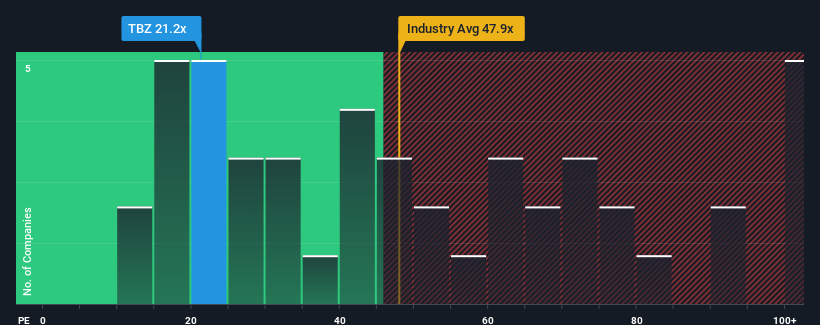- India
- /
- Specialty Stores
- /
- NSEI:TBZ
Benign Growth For Tribhovandas Bhimji Zaveri Limited (NSE:TBZ) Underpins Stock's 26% Plummet
Tribhovandas Bhimji Zaveri Limited (NSE:TBZ) shareholders that were waiting for something to happen have been dealt a blow with a 26% share price drop in the last month. Looking at the bigger picture, even after this poor month the stock is up 51% in the last year.
After such a large drop in price, Tribhovandas Bhimji Zaveri's price-to-earnings (or "P/E") ratio of 21.2x might make it look like a buy right now compared to the market in India, where around half of the companies have P/E ratios above 32x and even P/E's above 61x are quite common. Although, it's not wise to just take the P/E at face value as there may be an explanation why it's limited.
Earnings have risen firmly for Tribhovandas Bhimji Zaveri recently, which is pleasing to see. One possibility is that the P/E is low because investors think this respectable earnings growth might actually underperform the broader market in the near future. If that doesn't eventuate, then existing shareholders have reason to be optimistic about the future direction of the share price.
View our latest analysis for Tribhovandas Bhimji Zaveri

Does Growth Match The Low P/E?
Tribhovandas Bhimji Zaveri's P/E ratio would be typical for a company that's only expected to deliver limited growth, and importantly, perform worse than the market.
Retrospectively, the last year delivered an exceptional 20% gain to the company's bottom line. Pleasingly, EPS has also lifted 33% in aggregate from three years ago, thanks to the last 12 months of growth. Accordingly, shareholders would have probably welcomed those medium-term rates of earnings growth.
Comparing that to the market, which is predicted to deliver 26% growth in the next 12 months, the company's momentum is weaker based on recent medium-term annualised earnings results.
With this information, we can see why Tribhovandas Bhimji Zaveri is trading at a P/E lower than the market. Apparently many shareholders weren't comfortable holding on to something they believe will continue to trail the bourse.
The Key Takeaway
The softening of Tribhovandas Bhimji Zaveri's shares means its P/E is now sitting at a pretty low level. Using the price-to-earnings ratio alone to determine if you should sell your stock isn't sensible, however it can be a practical guide to the company's future prospects.
As we suspected, our examination of Tribhovandas Bhimji Zaveri revealed its three-year earnings trends are contributing to its low P/E, given they look worse than current market expectations. Right now shareholders are accepting the low P/E as they concede future earnings probably won't provide any pleasant surprises. If recent medium-term earnings trends continue, it's hard to see the share price rising strongly in the near future under these circumstances.
And what about other risks? Every company has them, and we've spotted 3 warning signs for Tribhovandas Bhimji Zaveri (of which 1 can't be ignored!) you should know about.
Of course, you might also be able to find a better stock than Tribhovandas Bhimji Zaveri. So you may wish to see this free collection of other companies that have reasonable P/E ratios and have grown earnings strongly.
Valuation is complex, but we're here to simplify it.
Discover if Tribhovandas Bhimji Zaveri might be undervalued or overvalued with our detailed analysis, featuring fair value estimates, potential risks, dividends, insider trades, and its financial condition.
Access Free AnalysisHave feedback on this article? Concerned about the content? Get in touch with us directly. Alternatively, email editorial-team (at) simplywallst.com.
This article by Simply Wall St is general in nature. We provide commentary based on historical data and analyst forecasts only using an unbiased methodology and our articles are not intended to be financial advice. It does not constitute a recommendation to buy or sell any stock, and does not take account of your objectives, or your financial situation. We aim to bring you long-term focused analysis driven by fundamental data. Note that our analysis may not factor in the latest price-sensitive company announcements or qualitative material. Simply Wall St has no position in any stocks mentioned.
About NSEI:TBZ
Tribhovandas Bhimji Zaveri
Designs, manufactures, retails, and sells jewelry primarily in India.
Proven track record with mediocre balance sheet.
Similar Companies
Market Insights
Community Narratives



